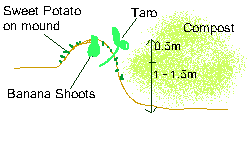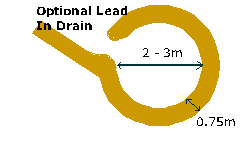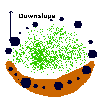How to Grow a Banana Circle
By growing Bananas in a circle, you can increase production, and avoid the untidyness often associated with Bananas.
Contents
Goals
- Easy, large, production from a small space
- Multi-crop system
- Consume organic waste - especially from bananas.
- Retain moisture, or soak up excess
- Easy access for harvesting
- A tidy way of growing Bananas
- Grey water sink - including for Laundry
What You'll Need
- Lots of Mulch
- Ideally use of a small excavator
- Sweet potato cuttings:
- About 7 banana shoots: collected from suckers which appear beside mother plants, slice off with a sharp spade as close to the mother plant as possible
- Optionally
- Taro
- Arrow root
- Canna Lilly
- Comphrey
Construction
Pick a location - the bananas will grow to about 4 meters, and generate shade. A location where water gathers would be good since the bananas can make good use of the water.
Dig a hole 1-1.5 meters deep and 2-3 meters diameter, piling the soil in a mound around it. Depending on location, you can leave a gap for water to flow into the middle, and add a lead-in drain, or swale.
If the location is on a slope, then build the mound as a crescent to catch the water.
The size can be reduced to a circle 1-1.5 meters diameter if dwarf bananas are used.
Plant the shoots around the top of the mound,[the highest point] evenly spaced. Dot in sweet potato cuttings over mound with the intention of covering mound and mulch pit. Place optionals on the inside edge of mound where mulch from pit makes contact and outside edge where the mound makes contact with the ground. Fill centre of circle [mulch pit] up to 2 meters high with garden prunings/old banana stems/unwanted suckers/optionals growth/straw mulch etc..This will feed your bananas and tidy up your garden.
In the wet tropics you can put logs into the middle to rot, in the cooler sub-tropics use more green prunings.
Maintenance, Pests and Problems
 Keep one mature plant fruiting, a second half grown, and one sucker growing in the same direction around the top of the mound for all 7 original plants. This will ensure that your bananas circle will produce healthy bananas continuosly. Depending on the climate its likely that you'll get a bunch every three or four months from each of the seven families.
Keep one mature plant fruiting, a second half grown, and one sucker growing in the same direction around the top of the mound for all 7 original plants. This will ensure that your bananas circle will produce healthy bananas continuosly. Depending on the climate its likely that you'll get a bunch every three or four months from each of the seven families.
Keep the tree clean by removing broken and dying leaves cleanly to avoid rot and snake-habitat. The leaves can be used for plates.
Bats and parrots will take the ripe fruit - remove the "bell" (the flower) once the bunch is formed, also the bunch is best bagged for pest control, put a bag over the bunch, sealed at the trunk end, open at the other, the bags should be light and ideally have a silvered top, which confuses bat's radar as well as reflecting heat if you can't buy these then improvise from a white fertilizer bag with foil on top. Theoretically the bell can be eaten, but noone ever shared a recipe with me!
Cut down fruited banana at the first sign of yellow, and chop remaining plant stem and throw into mulch pit in the centre of the circle.
Unwanted suckers also to be placed in mulch pit.
Keep mulch pit topped up with new organic material for best results.
Problems
In Australia bananas commonly get bunchy-top disease which is recognizable by the leaves all bunching together at the top of the plant instead of opening. They can also get a borer (beatle) which makes it rot and the plant starts wilting. In both cases, remove the plant, including the roots and mulch it.
They don't like severe winds, if this is a problem, reduce the foliage by removing any even slightly damaged leaves before the windy season.
Variations
 A banana circle also makes a good place for an outdoor shower, or even, where legal, as an outdoor toilet, although in this case make sure to cover with organic matter.
A banana circle also makes a good place for an outdoor shower, or even, where legal, as an outdoor toilet, although in this case make sure to cover with organic matter.
This way of growing will also work for Papayas, or in the tropics for Palms, but don't mix them as the other plants will tangle with bananas.


